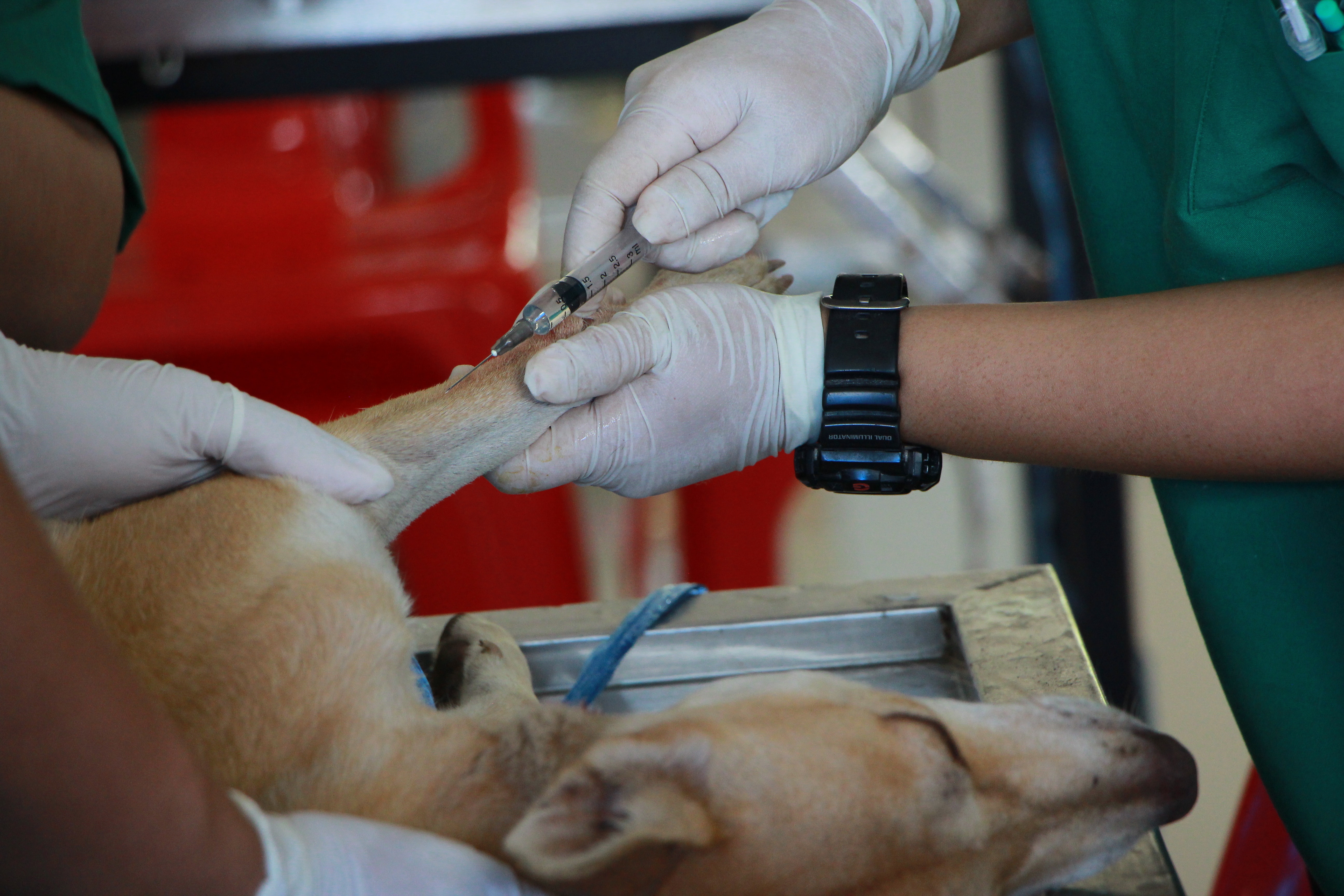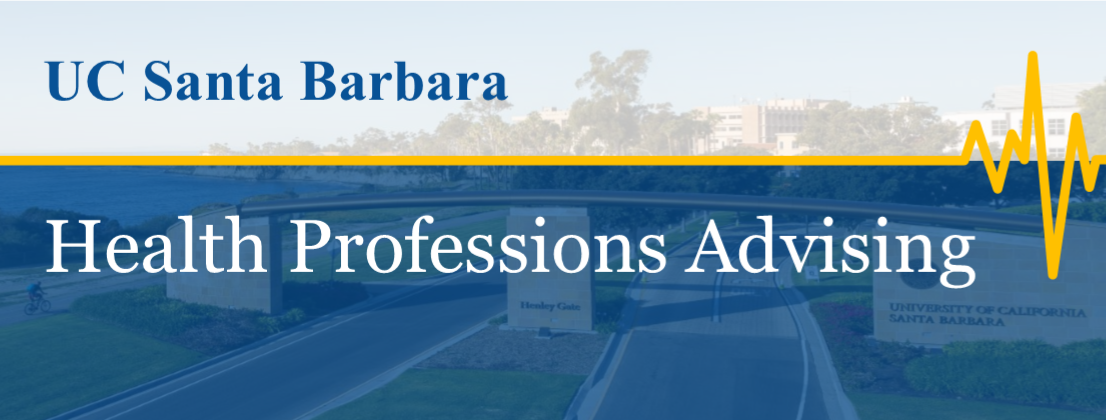UCSB Veterinary School Preparation Chart Click Here

SO YOU WANT TO BE A VETERINARIAN?
Doctors of Veterinary Medicine (DVMs) are dedicated to animal welfare. Veterinarians diagnose and treat diseases and injuries in animals. They also help prevent the spread of disease from animals to humans.
PREREQUISITES: THESE ARE GENERAL PREREQUISITE COURSES THAT MANY SCHOOLS OF VETERINARY MEDICINE REQUIRE FOR ADMISSION; HOWEVER, COURSE REQUIREMENTS OFTEN VARY FROM ONE SCHOOL TO THE NEXT. ADDITIONALLY, THERE ARE SEVERAL OTHER COURSES THAT ARE NOT REQUIRED BY SOME SCHOOLS OF VETERINARY MEDICINE BUT ARE HIGHLY RECOMMENDED. WE ENCOURAGE ALL STUDENTS TO VISIT THE WEBSITES OF THE PROFESSIONAL SCHOOLS YOU PLAN TO APPLY TO IN ORDER TO FAMILIARIZE YOURSELF WITH EACH SCHOOL'S ADMISSION REQUIREMENTS AND PROCESS. IF YOU ARE STILL UNSURE WHETHER COURSES YOU'VE TAKEN WILL SATISFY A PARTICULAR SCHOOL'S REQUIREMENTS, PLEASE REACH OUT DIRECTLY TO THE SCHOOL.
|
General Chemistry (Full Year/3 Quarters) |
CHEM 1A (4 units): General Chemistry CHEM 1B (3 units): General Chemistry CHEM 1C (3 units): General Chemistry CHEM 2AL (2.5 units): General Chemistry Lab CHEM 2BL (2.5 units): General Chemistry Lab |
|
Biological Sciences (Full Year/3 Quarters) |
MCDB 1A (4 units): Intro. To Biology I MCDB 1B (3 units): Intro. To Biology II--Physiology MCDB 1LL (1.5 units): Intro. To Biology I Lab EEMB 2 (2 units): Intro. To Biology II—Ecology and Evolution EEMB 3 (3 units): Intro. To Biology III EEMB 2LL (1.5 units): Intro. To Biology Lab II |
|
Organic Chemistry (Full Year/3 Quarters) |
CHEM 109A (4 units): Organic Chemistry CHEM 109B (4 units): Organic Chemistry CHEM 109C (4 units): Organic Chemistry CHEM 6AL (3 units): Organic Chemistry Lab (Chemistry 109A with a minimum grade of a C-; and Chemistry 109B (may be taken concurrently)) CHEM 6BL (3 units): Organic Chemistry Lab (Chemistry 6AL and 109A with a minimum grade of C-; and Chemistry 109B). Note: Even though this lab is no longer required for MCDB/EEMB majors, whether or not you choose to take the second lab should be based on the requirements for your major and your own research into the admissions requirements at each veterinary school you hope to apply to. If unable to find the information on a particular program's website, email their veterinary school admissions office for clarification. |
|
Physics (Full Year/3 Quarters) |
PHYSICS 6A (3 units) and PHYSICS 6AL (1 units): Introductory Physics w/Lab PHYSICS 6B (3 units) and PHYSICS 6BL (1 units): Introductory Physics w/Lab PHYSICS 6C (3 units) and PHYSICS 6CL (1 units): Introductory Physics w/Lab Note: Students who complete the PHYSICS 1 series will need to take PHYSICS 1-2-3-4-5 and PHYSICS 3L-4L-5L to satisfy a full year of Physics with labs. If your major only requires you to complete through PHYSICS 4 and PHYSICS 4L, then you may enroll in PHYSICS 6AL to satisfy the final lab requirement. If allowed by your major, we encourage students to complete the Physics 6 series instead. Note: Mathematics 2A or 3A or 34A or AP Math AB Exam score of 3 or higher are required for Physics 6A. Math courses may be taken concurrently with Physics 6A. |
|
Biochemistry (2-3 Quarters) |
Many veterinary schools require Biochemistry and several require more than one quarter. Please consider the following options for completion of this requirement:
MCDB and Non-MCDB majors may choose to take MCDB 110 (UCSB prerqes: Chem 1A-B-C and 109A-B, with grades of C or better, are prereqs.) if your programs only require 1 quarter of Biochemistry. Note: Some veterinary schools may require a full year of Biochemistry. Always review the requirements for your major and complete your own research into the admissions requirements at each veterinary school you hope to apply to. If unable to find the information on a particular program's website, email their veterinary school admissions office for clarification. |
|
Genetics (1 Quarter) |
MCDB 101A (UCSB prereqs: MCDB 1A-B, EEMB 2; and, Chemistry 1A-B-C; completion of all listed prerequisites with a grade of C or better.) |
|
Physiology (1 Quarter) |
MCDB 111 Note: Be sure to check individual program websites to determine whether or not a lab is necessary for the Physiology course. If a lab is required, consider taking the course at SBCC or another institution that offers it with a lab. |
|
English/Writing (Full Year/3 Quarters) |
A combination of 3 UCSB courses taken in the Writing or English departments should fulfill the full year of English requirement for most California veterinary schools. Courses that satisfy GE Areas A-1 and A-2 will satisfy the English requirement. Click here for information on these courses. Also, courses that satisfy the GE Special Subject Area Writing requirement should not be considered sufficient to satisfy the full year of English requirement. Remember, it is your responsibility to check the admissions requirements at each veterinary school you hope to apply to in order to make sure that the courses you take at UCSB and elsewhere will satisfy each program's specific requirements. |
|
Social/Behavioral Sciences & Humanities (2 Courses) (Highly Recommended; May be required by some programs.) |
PSY 1 and SOC 1 |
|
Highly recommended: Prerequisite courses listed are minimum requirements; however, most successful applicants will have exceeded the minimum requirements by taking additional upper division science courses. Examples of appropriate courses include but are not limited to: |
*MCDB 131 - Gen. Microbiology (Note: May be required by some programs.) MCDB 101A - Molec. Genetics I MCDB 134 - General Animal Virology MCDB 103 - Cell Biology |
|
If you choose not to major in one of the natural sciences, you may wish to include one or two additional science electives in your program of study if your schedule permits. *Math requirements may vary by school so be sure to research individual prerequisites. |
|
|
Sample Pre-Veterinary Course Schedule, Years 1 & 2 (To be used as a guide and is not intended to be strictly adhered to by all pre-vet students!) |
|||||||||||
|
|
Fall Quarter |
Winter Quarter |
Spring Quarter |
||||||||
|
Year 1 |
Chem 1A Mathematics or Statistics (See above) GE or Elective |
Chem 1B + 2AL Math or Stats (See above) GE or Elective GE or Elective (if you feel you can handle another course) |
Chem 1C + 2BL Math or Stats (See above) GE or Elective GE or Elective |
||||||||
|
Year 2 |
MCDB 1A Chem 109A GE or Elective GE or Elective? |
MCDB 1B EEMB 2 MCDB 1LL Chem 109B Chem 6AL (May be taken later.) |
EEMB 3 EEMB 2LL Chem 109C Chem 6BL (May be taken later.) GE or Elective |
||||||||
|
|||||||||||
 Extracurriculars
Extracurriculars
Participation in veterinary-related extracurricular experiences communicates to an admissions committee that you are committed to this career pathway and have already begun to develop the soft skills and hands on experience useful for veterinary school. Veterinary Schools look for students who have completed a variety of vet-related extracurricular experiences (working with marine wildlife, non-profits, conservation efforts, shelters, veterinary clinics, etc.), to include those that further develop skills and exposure to working with a diverse array of wildlife alogside professionals in the field.
The 3 D's
- Duration: Consider the length of your extracurricular experiences. How much time have you spent in each experience? To what extent have you developed knowledge or expertise during your individual experiences, etc. In what ways have you contributed to the organizations and communities you have gotten involved in?
-Depth: Aim for a progression of duties and responsibilities that allow for increased hands-on experiences as you continue to build your resume and/or CV throughout your undergraduate years.
-Diversity: Engaging in hands-on opportunities with a diverse array of wildlife demonstrates professional readiness and an openness to learning and working with diverse wildlife and in diverse settings.
EXAM AND GPA
The Graduate Record Exam (GRE) is a standardized examination that consists of four multiple-choice sections that cover basic mathematics and reading comprehension skills. The GRE is designed to measure general academic ability. It is required by most of the American PA schools. Typically, students take the GRE about one calendar year prior to their intended date of matriculation to professional school. The GRE is a nationally standardized test, similar to the ACT and SAT. A GRE score is good for three years at most schools, so taking the test in the spring of junior year does not necessarily mean that you must enter PA school right after college graduation. Average scores are typically above a 300 (Combined scores from the Verbal and Quantitative Reasoning sections).
Grade Point Average (GPA): All required coursework must be completed with a grade of “C” (2.00) or better to fulfill the requirement. A “C-minus” or lower is not acceptable. Any required science course taken more than 8 years ago may be subject to review and the applicant may be asked for further information or to repeat the course.
Transcript Review and Grade Trends: Admission committees conisder a number of factors incluidng and beyond the final grades earned in courses. For example, admission committees will review and consider the number of courses/units taken each quarter, whether courses were taken P/NP, retaken, and were withdrawn from, resulting in a W on the official transcript. To learn more about what your official transcripts communicate to admissions committees, please review the AAMC's Anatomy of an Applicant Guide. (A link to the guide can be found in the first paragraph in the Current Students section of our website.)
TIMELINE
| **Students should note that there is no set path or timeline that dictates when students have to take their admission test or apply to professional school. Professional schools DO NOT penalize studenst for not applying at a particular time. The timeline above is only a guide, and students should plan to meet with a pre-health advisor to discuss their individual goals and needs | |||||
|
|||||
ADDITIONAL RESOURCES:
Association of American Veterinary Medicine Colleges Click Here
AAVMC Programs and Prerequisites Click Here
Veterinary Medical College Application Service (VMCAS) Click Here
Texas Medical and Dental Schools Application (and Veterinary Schools) Click Here
GRE Information Click Here
CHECK OUT THE PRE-VETERINARY FAQ!
